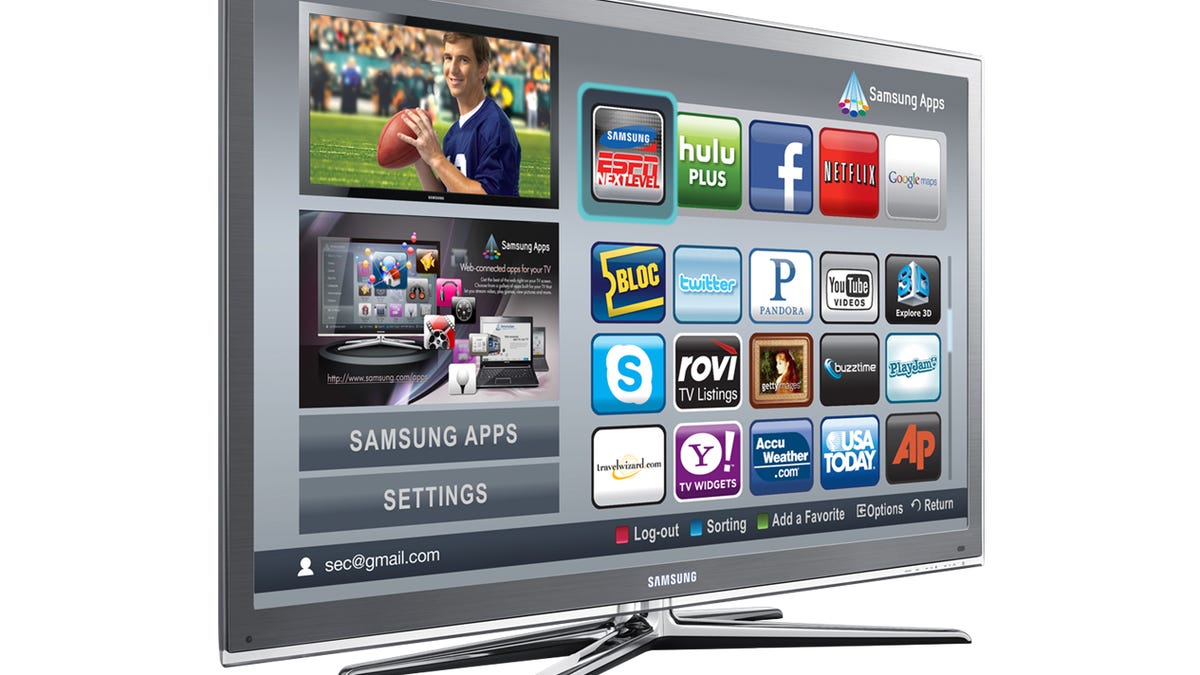Samsung tries to woo TV app developers
The consumer electronics giant uses its first developer conference in the United States to recruit app makers for its Web-connected TVs. Should we really hold the Apple comparisons?

Samsung Electronics think so. The Korean company is here pitching Samsung Apps, an application platform and marketplace, to media and content providers, as well as individual third-party developers.
Samsung Apps, as the platform is called, has been rolled out in other countries, but the company came here for its first developer conference, called Free the TV Challenge, to introduce its new software development kit to more than 100 developers in the United States.
Since app stores have become a given for portables--no phone maker would dream of launching a new smartphone today without access to one--Samsung says people want that same experience when flipping through channels from the couch.
"Consumers want and expect choice and control. Not just on the go, not just in front of computer, but in the living room," Eric Anderson, Samsung vice president of content development, told the group gathered in the ballroom of the Fairmont hotel.
Part of Samsung's pitch to developers on Tuesday was that its position in TVs and mobile phones will provide a large enough window for developers. Samsung already sells 45 million TVs a year and 200 mobile phones, so the implication is that if its TV app store takes off, the developers in on the ground floor will have their apps broadcast to a large chunk of TV owning people or people who will buy one in the next few years.
So far, there are 88 apps already available on Samsung's TV platform, but the company says there will be 200 by the end of the year. Samsung has been selling Web-connected TVs with apps from the likes of Yahoo, Netflix, Blockbuster, Facebook, Twitter, and others since 2009. By opening the platform up to third parties, it expects that number to increase exponentially over the next few years.
This move to a dedicated Samsung-centric platform represents a shift in strategy for the electronics maker, who had embraced Yahoo's TV platform and associated apps when it was launched in 2008. While Yahoo TV apps are still available on Samsung TVs via their own Yahoo app, the company moved away from it because the Yahoo platform wasn't made for devices beyond the TV, and Samsung is thinking bigger.
The idea is that content and apps can move from a mobile phone to a TV, Blu-ray Disc player, or home theater system and back via Samsung products--like the Samsung Galaxy smartphone and Samsung Internet-connected TVs and Blu-ray players.
There will be a place for people to buy virtual credit online and use it to purchase apps for their TV, Blu-ray player, or other device. And there are a few options for the remote control to help navigate these applications: a dedicated Samsung remote that has a touch screen with a virtual keyboard and number pad, an on-screen keyboard such as is already used on some TVs and game consoles, and an application that turns an Android phone or iPhone into a remote via an app called AllShare.
The vision for what Samsung wants with its Samsung Apps and connected devices is similar in ambition to Apple's App Store, which is accessible by its iPhone, iPod Touch, and iPad products--and we could find out Wednesday if that will eventually include Apple TV as well.
Samsung is a serious player in almost every consumer electronics category, including the market leader in TVs, and it is making a huge push in smartphones. So it wants to distance itself from the Apple comparisons, not invite them.
Samsung emphasized that Samsung Apps is an "open platform without proprietary software or restrictive licensing terms."
Tim Baxter, president of Samsung Consumer Electronics in the United States, pitched developers on less restrictive rules on Samsung's platform.
"Our goal is clear: to provide an environment that lets you focus on your ideas rather than get mired in protocols," he said Tuesday. "We want you to decide what to do with your app. You choose how much to charge, what country to launch in, and what device to be on."
That means the SDK has tools based on open standards such as JavaScript, XML, and Flash Lite 3.0 from Adobe Systems, according to Samsung's director of content, Olivier Manuel.
The question is, if they like open, and they wanted an app store and marketplace, why not partner with Google? Google is already working with Sony on Google TVs, so why not Samsung? And Samsung already partners with Google on Android for phones.
But Samsung would prefer to do it all themselves--which, yes, sounds a lot like Apple.
"The benefits to having a vertically integrated platform is that if we want to do something, like (eventually) integrate with mobile phones, we can do it quickly," said Manuel, and not have to wait for Google.
One of the things Manuel, who is the liaison to developers, cautioned was that Samsung's app store is not supposed to be a way to push apps that are made for the phone to the TV. It's about enhancing the "lean back" experience, he said. Don't make apps for the phone--make apps that help people enjoy TV the way they're used to.
That means adding news tickers that run under a show or movie people or watching, or a crawl of social-network feeds--essentially things that are visual and use all of a giant 40- or 50-inch screen.
Whether developers will follow that advice is yet to be seen, since they're just now getting access to the SDK. One thing Samsung says it won't do is reject an app from its store just because it may not be not exactly what the company thinks its customers are looking for. While Samsung plans to highlight apps it thinks take advantage of inherent TV-watching characteristics, ultimately, customers will cast the vote on what works.

